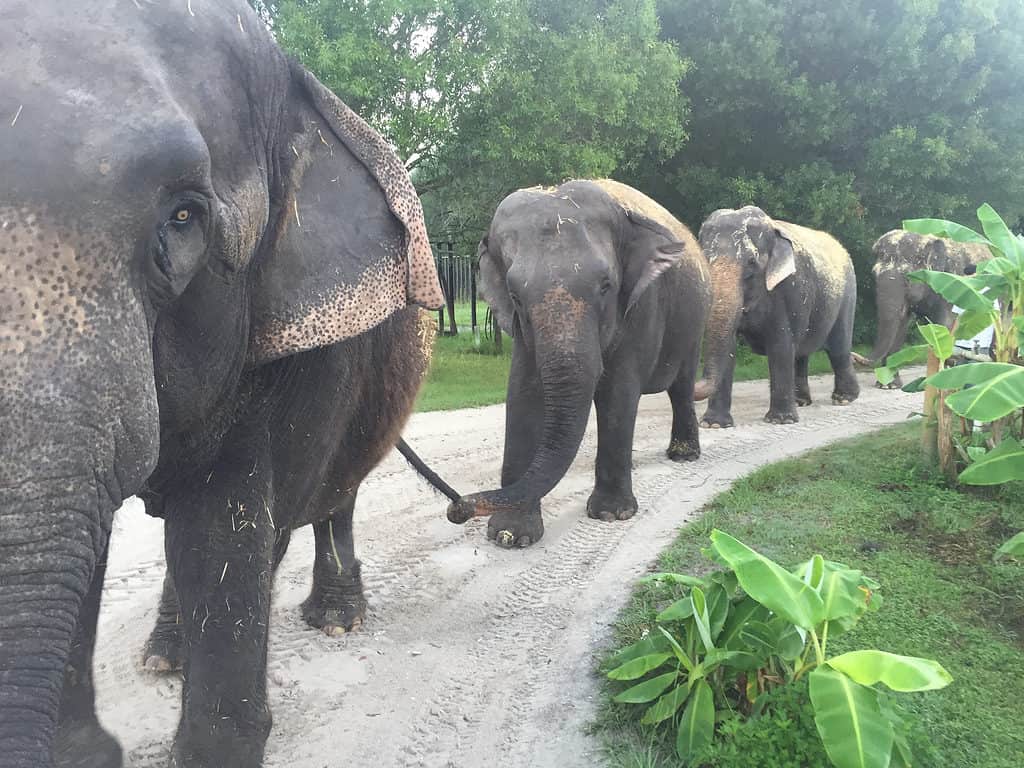Elephants are majestic giants. They are typically peaceful and calm, but bull elephants can quickly become aggressive when irritated, sick, or harassed. For this reason, park rangers often advise people to exercise patience when they see elephants blocking or crossing a road, maintain a safe distance, and turn off car engines to prevent elephants from mistaking car noses for a challenge.
The train driver in the video below did not observe any of these safety precautions. Rather than continue his journey, the driver decides to stop his train a few feet from the elephant, so the people on the train can admire the animal. Unfortunately, the elephant mistakes the train for an aggressor and tries to attack the engine. Not even the train’s loud hoot is sufficient to scare away the aggressive male elephant!
Watch the Amazing Footage Below!
How Do We Know It Is a Male Elephant?

Males only live with the herd during their youth. Once they mature, they move out and become solitary.
©Volodymyr Burdiak/Shutterstock.com
You have probably heard that elephants are social animals who live in their herds, but this is only true for female elephants. Female elephants prefer to live together in strong family units.
Males only live with the herd during their youth. Once they mature, they move out and become solitary. So even though female and male elephants continue to grow for the rest of their lives, males tend to be bigger.
Male elephants, both tuskers and tusk-less bulls, also go through a periodic phase called musth. During musth, a bull elephant produces a hormone-rich secretion known as temporin from the glands behind its eyes. The elephant also secrets a constant trickle of urine that flows down its hind legs.
The temporin is visible on the elephant in the video, confirming that it is in musth.
Musth is also characterized by increased reproductive hormones, making the elephant energetic, unpredictable, and increasingly restless. The elephant also becomes more irritated by movements and sounds.
The noise and vibration from the train cause the elephant in the video to challenge the train in a fight.
Female elephants can also be aggressive, but only if they sense their young ones are threatened.
Are Elephants Friendly?

Elephants can be friendly with humans as long as they have grown up in an environment with people.
©Ondrej Prosicky/Shutterstock.com
Elephants are generally gentle with other animals, even in the wild. They try not to hurt them unless provoked.
Yes, elephants can be friends with humans, but only if they have grown up in an environment with people. Those in captivity tend to be friendly to humans since they interact a lot with them. As a result, they are unlikely to be aggressive compared to those in the wild.
But always remember that elephants are still wild animals that can’t be fully domesticated.
What to Do When You Encounter an Elephant

When encountering a herd of elephants, it’s best to ignore them as they could react violently to interaction.
©ElephantErik/Shutterstock.com
If you encounter an elephant or a herd of elephants, do your best to ignore them.
Even if a wild animal looks docile, touching, taking photos, and feeding it could change its behaviors and provoke a violent reaction.
Attracting the attention of an already aggressive elephant is a guaranteed way of inviting an attack. As the train approaches the Indian elephant in the above video, the driver makes two mistakes that result in the confrontation. Firstly, he stops the train right in front of the elephant. Secondly, he keeps the engine on and hoots at the elephant. The driver ignores the fact that an aggressive wild animal is unpredictable.
The photo featured at the top of this post is © Jeremy Lintott/Shutterstock.com
Thank you for reading! Have some feedback for us? Contact the AZ Animals editorial team.







